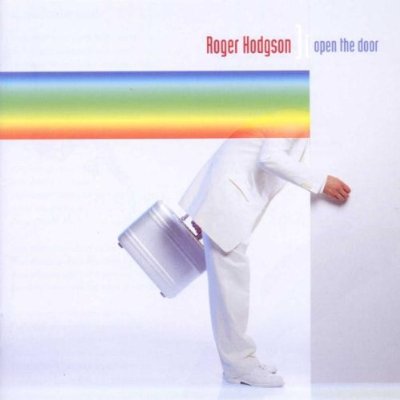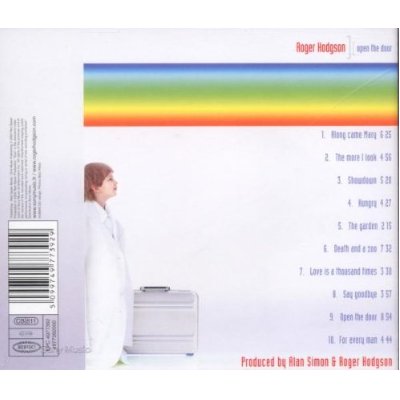Reviewed by Sue Bertram
When I sat down to listen Roger Hodgson’s album Open The Door, I couldn’t help but recall my first Supertramp record. I still remember gripping my new purchase, the LP , as I walked home from Rhino Records in my hometown of Claremont, California. How many hours I used to spend poring over racks of albums in that wonderful store, wishing I could buy them all! On arriving home, I went straight to the turntable, and as much as I loved every song on the album, two stood out, “Bloody Well Righ”t and “Dreamer” (oh, yes, I’m well aware how that song has been maligned!). I love those songs just as much today as I did then. A certain desperate emotional intensity lurked in these tracks, which was somewhat dimmed in their later, more commercialized albums. Open The Door has some of the same quality, and the sound of Roger Hodgson’s voice takes me right back to that time in an instant, making me feel like a grown-up and a child at the same time.

 The artwork on Open The Door shows a man entering the passage, and a child emerging from it. It conveys a depth of growth in wisdom without losing the child’s ability to wonder. Supertramp’s intensity was rooted in this tension between child and adult. But how does one shed the infantile without forgetting the miraculous? Hodgson’s Open The Door shows that he has matured without losing his ability to wonder; his strong and balanced character shows in his music, and both deserve respect and admiration. Roger’s maturity can be judged by his actions; he kept his head when all about him were losing theirs; he did what was right even if it was incomprehensible to the rest of us. Here are a couple of examples for illustration.
The artwork on Open The Door shows a man entering the passage, and a child emerging from it. It conveys a depth of growth in wisdom without losing the child’s ability to wonder. Supertramp’s intensity was rooted in this tension between child and adult. But how does one shed the infantile without forgetting the miraculous? Hodgson’s Open The Door shows that he has matured without losing his ability to wonder; his strong and balanced character shows in his music, and both deserve respect and admiration. Roger’s maturity can be judged by his actions; he kept his head when all about him were losing theirs; he did what was right even if it was incomprehensible to the rest of us. Here are a couple of examples for illustration.
In 1983, everyone questioned Roger’s sanity when the legendary voice and frontman for Supertramp decided to leave the band at the pinnacle of its success. However, think of this: he kept his marriage, and in 1997 his son toured and played with him—clearly an indication of their great relationship. Many people on their deathbed wish they had spent less time making money and more time with their kids, but only the wise ones take drastic action before the final curtain falls. After years of pumping all his passion into the band, Hodgson abdicated his well-earned superstardom simply because he felt like he needed to spend more time focusing on his family. Even though others might have doubted his choices, he had enough confidence to know where true harmony lies, which became evident through his continuing work; taking a break from the frenetic world of the band didn’t stop him from making new music.
Just before the release of his second album, Hai Hai in 1987, Hodgson fell from a loft while at home and broke both wrists, which kept him incapacitated for nearly two years. Some doubted he would ever play again; however, he wouldn’t let despair take over and clawed his way back.
Hodgson’s fourth solo effort, Open The Door, was released in 2000. The atmosphere of the album harkens back to some of his older work—hope, love, striving, rage, sadness—without trying to pretend, hide or tone down anything. Roger Hodgson clearly breathes with a full chest, sings with a full voice and doesn’t pull any musical punches on this record. The stellar skills of all the players combine for a perfect and pristine sound; however, nothing is commercialized. There are two-minute intros, three-minute cadenzas, long instrumental passages and other wonderful treats, which, unfortunately, so often end up in the amputation bins of the commercial-production factories.
On the first track, “Along Came Mary”, the listener is given a real treat in the form of bagpipes and arrangements that include the Symphonic Orchestra of Prague. You can feel the cool breeze in a momentary interlude that crashes into a sudden classic Supertramp aggressive blast of music. And then, yes—that is ex-Yes Trevor Rabin on “The More I Look,” a sweetly melancholic piece that ends on a high note—“The more I look, the more I see. The more that life gives to me.” “Showdown” is a funky, fun, harmonica-blasting tune with an environmental and political message. The solution? Revolution? Maybe. One thing we know, don’t look to politicians or television preachers for your answers. And I dare you not to tap your toes! The music continues with “Hungry,” the most pop-sounding tune on the album, but a catchy little love song that’s hard to resist, hitting on themes of loneliness and issues of self-worth, but light-hearted all the same. Does anyone ever get tired of those saxophone solos? They’re just plain fantastic. Next is a short sad, dark little song, “The Garden”, which holds some wisdom in acknowledging that “love is all the answers.” Roger clearly has lived it, because, from his mouth, it doesn’t sound like a platitude. The intro to “Death and a Zoo” is pure heart stirring with a haunting uillean pipe that leads to a gorgeous simple piano ballad. Yet soon enough, it blossoms into screaming raw vocals and percussion! Animal noises, vocals and drums lead to a cacophonous crescendo in which The Beatles’ influence can be heard loud and clear—think Sergeant Pepper’s “A Day in the Life”—and then lets us down quickly and softly in one fell swoop that circles back around to its quiet beginning. Fantastic. “Love is a Thousand Times” brought me right back to classic Supertramp. This is a short, sweet, emotive tune with some great harmonizing and an easygoing style. Again, the difference between the platitude and the wisdom is the man who utters it, and Roger clearly makes it deep and inspiring. We’re then confronted with another somewhat sad, dark tune, “Say Goodbye,” which seems to be a lament for the old days and a plea to embrace the new all at the same time. Open The Door brings us that stylistic harmonica that comes right from the soul and pulls no punches as we’re drawn into the crystal-clear high vocals. “Has our love gone astray?…Gone away?…gone away?…as the song progresses, there’s an energetic fervor that accompanies the pleas, “I want to be free…I want to go home…I want to be with you…play with you…dream with you…stay with you now…” that leads to a hefty finish with the grooviest beat of the album, Bulgarian singers and the Orchestra of Prague, winding back down to that slow, emotional harmonica and a parting line of vocals from Hodgson. “For Every Man” is another ballad with nostalgic notes, just the right track with which to end.
Hodgson’s songs ring with power, emotion, and wisdom; certain things cannot be learned, they simply should be lived. He asks the larger questions in life and doesn’t shy from the sadness or melancholy the answers may bring. He keeps his head and his ideals in an industry that is often soul-crushing. As he says at both the beginning and end of the CD jacket, “There is nothing that we know, just watch the magic flow…” There’s magic here, especially if you’re an old Supertramp (did I even realize how much that meant “Roger Hodgson”?) junkie like me.
I like your fantastic web site. Just what I was searching for!
Best regards
Thanks, and welcome, John! We’re glad you’re here!